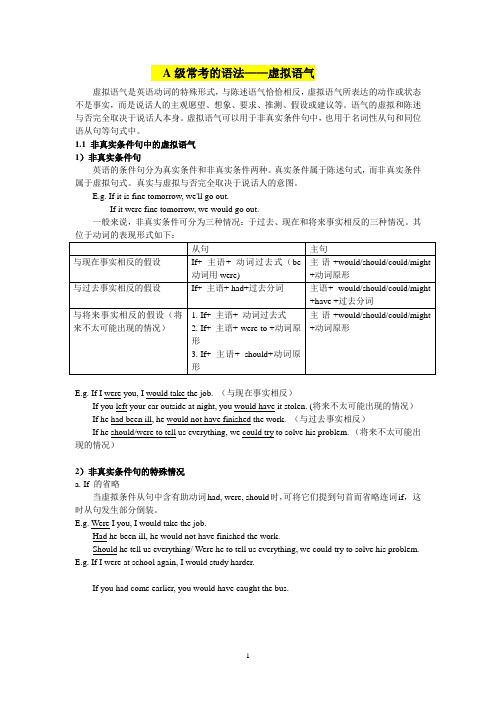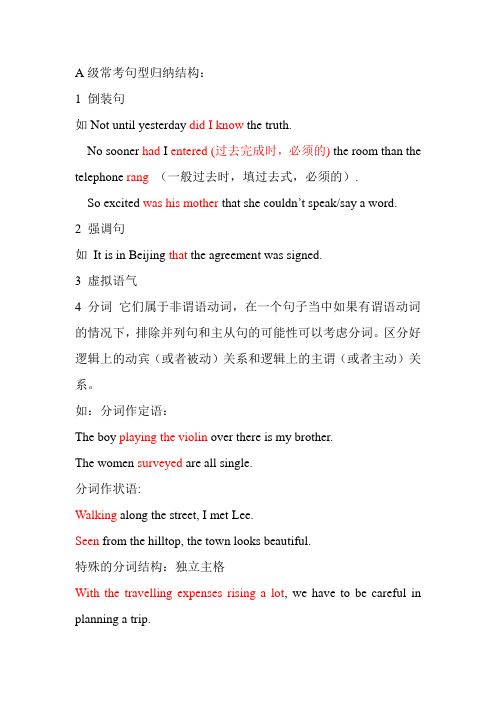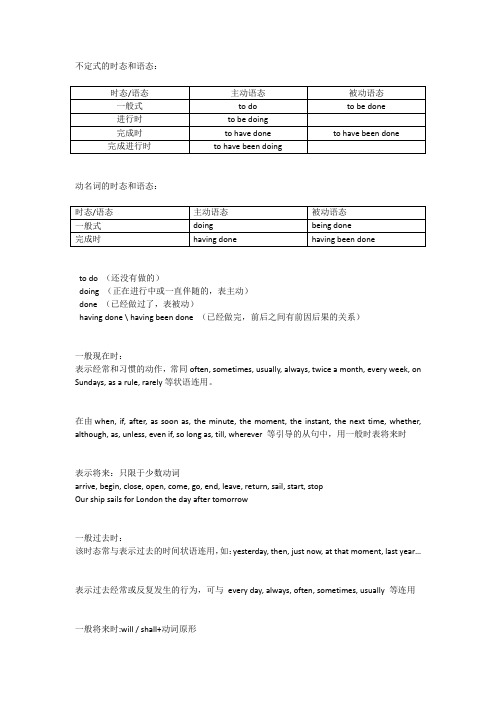A级语法考点归纳
- 格式:doc
- 大小:47.50 KB
- 文档页数:6

A级常考的语法——虚拟语气虚拟语气是英语动词的特殊形式,与陈述语气恰恰相反,虚拟语气所表达的动作或状态不是事实,而是说话人的主观愿望、想象、要求、推测、假设或建议等。
语气的虚拟和陈述与否完全取决于说话人本身。
虚拟语气可以用于非真实条件句中,也用于名词性从句和同位语从句等句式中。
1.1 非真实条件句中的虚拟语气1)非真实条件句英语的条件句分为真实条件和非真实条件两种。
真实条件属于陈述句式,而非真实条件属于虚拟句式。
真实与虚拟与否完全取决于说话人的意图。
E.g. If it is fine tomorrow, we'll go out.If it were fine tomorrow, we would go out.一般来说,非真实条件可分为三种情况:于过去、现在和将来事实相反的三种情况。
其位于动词的表现形式如下:从句主句与现在事实相反的假设If+ 主语+ 动词过去式(be动词用were) 主语+would/should/could/might +动词原形与过去事实相反的假设If+ 主语+ had+过去分词主语+ would/should/could/might+have +过去分词与将来事实相反的假设(将来不太可能出现的情况)1.If+ 主语+ 动词过去式2.If+ 主语+ were to +动词原形3.If+ 主语+ should+动词原形主语+would/should/could/might+动词原形E.g. If I were you, I would take the job. (与现在事实相反)If you left your car outside at night, you would have it stolen. (将来不太可能出现的情况)If he had been ill, he would not have finished the work. (与过去事实相反)If he should/were to tell us everything, we could try to solve his problem. (将来不太可能出现的情况)2)非真实条件句的特殊情况a.If 的省略当虚拟条件从句中含有助动词had, were, should时,可将它们提到句首而省略连词if,这时从句发生部分倒装。

A级常考句型归纳结构:1 倒装句如Not until yesterday did I know the truth.No sooner had I entered (过去完成时,必须的) the room than the telephone rang(一般过去时,填过去式,必须的).So excited was his mother that she couldn’t speak/say a word.2 强调句如It is in Beijing that the agreement was signed.3 虚拟语气4 分词它们属于非谓语动词,在一个句子当中如果有谓语动词的情况下,排除并列句和主从句的可能性可以考虑分词。
区分好逻辑上的动宾(或者被动)关系和逻辑上的主谓(或者主动)关系。
如:分词作定语:The boy playing the violin over there is my brother.The women surveyed are all single.分词作状语:W alking along the street, I met Lee.Seen from the hilltop, the town looks beautiful.特殊的分词结构:独立主格With the travelling expenses rising a lot, we have to be careful in planning a trip.W eather permitting, we will go on picnic.The class being over, we can go home.It being Sunday, we can take a rest at home.5 The 比较级…, the 比较级…越。
越。
The more money I have, the happier I feel.The more time I have, the better I can do the job.6 两者当中较为。


不定式的时态和语态:动名词的时态和语态:to do (还没有做的)doing (正在进行中或一直伴随的,表主动)done (已经做过了,表被动)having done \ having been done (已经做完,前后之间有前因后果的关系)一般现在时:表示经常和习惯的动作,常同often, sometimes, usually, always, twice a month, every week, on Sundays, as a rule, rarely等状语连用。
在由when, if, after, as soon as, the minute, the moment, the instant, the next time, whether, although, as, unless, even if, so long as, till, wherever 等引导的从句中,用一般时表将来时表示将来:只限于少数动词arrive, begin, close, open, come, go, end, leave, return, sail, start, stopOur ship sails for London the day after tomorrow一般过去时:该时态常与表示过去的时间状语连用,如:yesterday, then, just now, at that moment, last year…表示过去经常或反复发生的行为,可与every day, always, often, sometimes, usually 等连用一般将来时:will / shall+动词原形Shall只能用于第一人称多种形式:will dobe going to + 动词原形be to + 动词原形(义务、必要性)be about to + 动词原形过去将来时:would (should) + 动词原形was / were going to + 动词原形现在完成时:到现在已经完全完成的行为或一直持续到现在的行为或状态它强调现在已有一定的影响或结果形式:have / has + done常连用的词有:already, yet, lately, often, rarely, ever, just, recently, so far, up to now, up till now, since, up to the present, for the past 10 years, these few days, all my life…过去完成时:在过去某一时间以前或某动作之前已完成的动作一个动作或状态在过去某时刻开始,一直延续到这一过去时间,且仍有继续的下去的可能性形式:had + done常与表示一段时间的状语连用(过去的过去)将来完成时:表示将来某一时刻之前或某一行为发生之前所完成的动作形式:will (shall) have + done常与by the time + 句子或by the end of + 现在或未来的时间状语过去进行时:过去某一时刻正在进行或发生的情况的动作将来某一时间正在进行的动作常表示安排好的事可表示预料不久或势必要发生的动作或情况形式:will (shall) be + doing现在完成进行时:动作从过去某时开始发生,一直延续到现在并可能继续下去形式:have (has) been + doing过去完成进行时:动作一直持续到过去某时刻并且还在进行形式:had been doing虚拟语气:需要“should + 动词原形”的虚拟语气表达建议、要求、命令等动词后的宾语从句常见的这类词有:advise, argue, ask, command, decide, demand, request, require, suggest, urge, insist 等insist表示坚持某种看法,suggest表示暗示的时候,从句用陈述语气。


A级复习资料(语法篇)I. 常考句型结构:1. 倒装句e.g. Not until yesterday did I know the truth.No sooner had I entered (过去完成时) the room than the telephone rang(一般过去时). So excited was his mother that she couldn’t speak/say a word.2. 强调句e.g. It is in Beijing that the agreement was signed.强调句的一个特点就是去掉it is…that…后原句是完整的句子。
上述句子去掉后变成The agreement was signed in Beijing. 只是把要强调的部分放到it is…that中间了。
这是强调句与定语从句的区别,定语从句去掉it is…that…不完整,如:It is this place that I like best. 这是定语从句,如去掉it is…that则原句变成This place…I like best...则不是完整句子成了碎片。
3. 虚拟语气(1)掌握好基本形式(特别是与过去事实相反的虚拟语气)和特殊形式(2)虚拟语气在宾语从句和主语从句中的应用宾语从句:order,demand,require,request,direct,command,urge,rule, suggest,advise,vote,propose move,recommend,prefer,decide,insist,desire,decree主语从句:vital,important,essential,necessary, impossible,natural,advisable,fitting,proper,appropriate,desirable4. 分词分词属于非谓语动词,在一个句子当中如果有谓语动词的情况下,排除并列句和主从句的可能性可以考虑分词。
大学英语A级考试——写作专题短语词组:1. be worth doing 值得做…2. look forward to doing sth 期盼做…3. be surprised at 惊讶于…4. to one’s surprise 让某人惊奇的是…5. be happy with sth 对…感到满意6. insist on doing sth 坚持做…7. Beyond one’s ability 超出某人的能力范围8. Spend (时间)in doing sth 花费时间做…9. Keep one’s eyes fixed on sth 一直盯着…看10. succeed in doing sth 成功做成…11. cannot/couldn’t do anything but do…“不能做…只能做…”12. would rather do sth. than do sth.“情愿做…而不愿做另外一件事情”英语三级书信作文常用句型1. I am writing to you in the hope that you could do me a favor to improve the horrible situation.2. I would like some detailed information on/about….3. I would be grateful if you could let me have details of ….4. I am writing to request some necessary information about….5. I am greatly concerned about….6. My appreciation to you for your generous help is beyond words. I wish I could repay it one day.7. Thank you very much for the kindness you showed me during….8. It is my pleasure/a great honor for me to extend an invitation to/invite you to….9. I will be expecting you, so do not disappoint me.10. I wish to apply for the position of… with your company.11. I graduated with a BA degree in…from…in….12. I am very excited and delighted over the good news that you are recruiting a….三级作文常考类型介绍信说明:你是大学教授王平,你的学生张刚即将毕业,毕业后拟到你的朋友Smith先生学校继续深造,攻读硕士学位。
英语A级语法大全:1 (see 、hear 、notice 、find 、feel 、listen to 、look at (感官动词)+do eg:I like watching monkeys jump2 (比较级and 比较级)表示越来越怎么样3 a piece of cake =easy 小菜一碟(容易)4 agree with sb 赞成某人5 all kinds of 各种各样a kind of 一样6 all over the world = the whole world 整个世界7 along with同……一道,伴随…… eg : I will go along with you我将和你一起去the students planted trees along with their teachers 学生同老师们一起种树8 As soon as 一怎么样就怎么样9 as you can see 你是知道的10 ask for ……求助向…要…(直接接想要的东西)eg : ask you for my book11 ask sb for sth 向某人什么12 ask sb to do sth 询问某人某事ask sb not to do 叫某人不要做某事13 at the age of 在……岁时eg:I am sixteen I am at the age of sixteen14 at the begin ning of …… ……的起初;……的开始15 at the end of +地点/+时间最后;尽头;末尾eg : At the end of the day16 at this time of year 在每年的这个时候17 be /feel confident of sth /that clause +从句感觉/对什么有信心,自信eg : I am / feel confident of my spoken English I feel that I can pass the test 18 be + doing 表:1 现在进行时2 将来时19 be able to (+ v 原) = can (+ v 原)能够…… eg : She is able to sing She can sing20 be able to do sth 能够干什么eg :she is able to sing21 be afraid to do (of sth 恐惧,害怕…… eg : I'm afraed to go out at night I'm afraid of dog22 be allowed to do 被允许做什么eg: I'm allowed to watch TV 我被允许看电视I should be allowed to watch TV 我应该被允许看电视23 be angry with sb 生某人的气eg : Don't be angry with me24 be angry with(at) sb for doing sth 为什么而生某人的气25 be as…原级…as 和什么一样eg : She is as tall as me 她和我一样高26 be ashamed to 27 be away from 远离28 be away from 从……离开29 be bad for 对什么有害eg : Reading books in the sun is bad for your eyes 在太阳下看书对你的眼睛不好30 be born 出生于31 be busy doing sth 忙于做什么事be busy with sth 忙于……32 be careful 当心;小心33 be differen t from…… 和什么不一样34 be famous for 以……著名35 be friendly to sb 对某人友好36 be from = come from 来自eg :He is from Bejing He comes from Bejing Is he from Bejing ? Does he come from Bejing ?37 be full of 装满……的be filled with 充满eg: the glass is full of water the glass is filled with water38 be glad+to+do/从句39 be going to + v(原)将来时40 be good at(+doing) = do well in 在某方面善长, 善于……41 be good for 对什么有好处eg : Reading aloud is good for your English42 be happy to do 很高兴做某事43 be helpful to sb 对某人有好处eg : Reading aloud is helpful to you 大声朗读对你有好处Exercising is helpful to your bady 锻炼对你的身体有好处44 be in good health 身体健康45 be in trouble 处于困难中eg : She is in trouble They are in tronble46 be interested in 对某方面感兴趣47 be late for = come late to 迟到eg: Be late for class 上课迟到48 be like 像…… eg : I'm like my mother49 be mad at 生某人的气50 be made from 由……制成(制成以后看不见原材料)51 be made of 由……制成(制成以后还看得见原材料) 52 be not sure 表不确定53 be on a visit to 参观54 be popular with sb 受某人欢迎55 be quiet 安静56 be short for 表**的缩写eg: 陶is short for 陶俊杰57 be sick in bed 生病在床58 be sorry to do sth be sorry for sb eg : I am sorry for you59 be sorry to hear that 60 be sorry to trouble sb eg : I am sorry to trouble you 61 be strict in doing sth 严于做某事eg : He's strict in obeying noles62 be strict with sb 对某人要求严格eg: Some students are not strict with them selves 这些学生对自己不严格63 be strict with sb in sth 某方面对某人严格64 be supposed to do 被要求干什么65 be sure 表确定66 be sure of doing sth 对做某事有信心eg: He is sure of winning I am sure of learning English well67 be sure of sth 对做某事有信心eg: I'm sure of my head (my teacher 我相信我的大脑(老师)68 be sure that sth 对做某事有信心eg: I'm suer that he can pass the test 我相信他能通过考试69 be sure to do sth一定会做某事eg: We are sure to pass the test 我们一定会通过这次考试We are sure to learn English well 我们一定能学好英语70 be terrified of + 名/动doing 害怕…… 71 be terrified to do sth 害怕做某事72 be the same as … 和什么一样73 be used to doing sth 习惯做某事eg: My father is used to getting up early 我爸爸习惯早He is used to sleeping in class 他习惯上课睡觉74 be worth doing 值得做什么75 be(feel) afraid to do sth 害怕做某事be afraid of sth 害怕某物be afraid that 丛句76 because+句子because of +短语eg : He was late because he had a headache He was late because of his headache77 begin to do = start to do 开始做某事start…with…=begin…with… 以什么开始什么eg : Let's begin the game with the song I begin to go home78 between…and… 两者之间79 borrow sth from sb 向……借…… lend sth to sb ( lend sb sth 借给……什么东西eg : I borrowed a pen from him he lent a pen to me ( he lent me a pen80 both = the same(as) = not different(from) 表相同81 bother 打扰bother sb to do stheg : I'm sorry to bother you ,but can you tell me to way to the station我十分道歉打扰你,但是你能告诉我怎么去车站the problem has been bothering me for weeks 这个问题困扰了我几个周了He's bothering me to lend him money82 by the end of 到……为止83 call sb sth eg : We call him old wang84 care 关心eg : Don't you care about this country's future ?你为什么不关心国家的未来85 catch up with sb 赶上某人86 chat with sb 和某人闲谈take sb to + 地点带某人去某地87 come in 进88 come over to 过来89 come up with 提出eg: Can you come up with a good idea 你能想出一个好办法吗?90 communicate with sb 和某人交流91 consider + doing 考虑做什么eg : Why not consider going to lu zhou 为什么不考虑去泸州?92 dance to 随着……跳舞eg : She likes dancing to the music 她喜欢随着音乐跳舞93 decide to do sth 决定做某事94 do a survey of 做某方面的调查95 do better in 在……方面做得更好96 do wrong 做错97 Don't forget to do sth 不要忘了做某事98 Don't mind+doing /从句/名词不要介意……99 each +名(单)每一个…eg : Each student has many books 每一个学生都有一些书100 end up +doing 101 enjoy +doing喜欢102 escape from 从……逃跑eg: The prisoners have escaped from the prison犯人从监狱里逃跑出来103 expect to do sth 期待做某事104 fall down 摔下来fall off 从哪摔下来105 fall in love with sb /sth 爱上什么106 far from 离某地远eg : The school is far from my home 107 find +it +adj +to do 发现做某事怎么样108 find sb/sth +adj 发现什么怎么样eg : I find the book interesting 109 finish 完成+doing(名词)110 fit to sb = be fit for sb 适合某人111 forget to do 没有做而忘了forget doing 做了而又忘了eg: Don't forget to go home I forget closing door 112 from…to… 从某某到某某eg: From me for her113 get /have sth down 做完,被(别人)做…eg: I have my hair cut 我理了发(头发被剪了)Tom got his bad tooth pulled out 汤母把他的坏牙拔掉了(被牙医拔掉了)114 get a part-time job= find a part-time job 115 get along well with sb = get on well with sb 与某人相处得好116 get along with sb = get on with sb 与某人相处117 get ready for = be ready for为什么而准备eg : I get ready for math I am ready for math 118 get sb in to trouble 给某人麻119 get sb to do sth120 get…from… 从某处得到某物121 give a talk 做报告eg: He is give a tall 122 give sth to sb give sb sth 给某人某物123 go fish 钓鱼go swimming 游泳124 go on to do 去做下一件事go on doing 继续做这件事125 go out away from go out of126 go to school 上学(用于专业的)go to the school 去学校(不一定是上学)127 good way to 好方法128 hate to do 讨厌没做过的事hate doing 讨厌做过的事129 have a party for sb 举办谁的晚会130 have a talk 听报告谈一谈131 have been doing 现在完成进行时eg : You have been talking You have been sleeping since132 have been to …( 地方)……去过某过地方have gone to …(地方)去了某地还没回来133 have fun +doing 玩得高兴134 have sth to do 有什么事要做eg: I have a lot of homework to do 我有很多家庭作业要做I have nothing to do 我没什么事情做135 have to do sth 必须做某事136 have trouble (problem) (in) doing sth 做什么事情有麻烦137 have…time +doing138 have…(时间)…off 放……假eg: I have month off 我请一个月得假139 hear sb +do/doing 听见某人做某事/正在做某事140 help a lot 很大用处141 help sb with sth \one's sth 帮助某人某事(某方面)help sb (to) do sth 帮助某人做某事142 hope to do sth 希望做某事143 How about(+doing) = What about(+doing)144 how do you like = what do you think of 你对什么的看法145 if : 是否=wethereg: I don't know if (wether) I should go to the party 我不知道我是否应该去参加晚会He don't know if (wether) we will arrive on time tomorrow morning 他不知道我们明天早上是否能准时到达146 if :如果,假如(全部接一般时态)+条件语态从句eg: I'll go to LuZhou if it does't rain 假如明天不下雨,我就去泸州If they change the plan they will let me know 假如他们要改变计划,他们会让我知道的I'll go to England ,if I have enough money next year 如果我明年由足够的钱,我就要去英国147 in one's opinion = sb think 某人认为148 in some ways 在某些方面149 in the end = finally(adv) 最后150 in the north of… 什么在什么的北方(north 北 sowth 南 west 西 east 东)。
大学英语三级语法大全名词性从句概述名词性从句在句子中起名词作用的句子叫名词从句 (Noun Clauses)。
名词从句的功能相当于名词词组, 它在复合句中能担任主语、宾语、表语、同位语、介词宾语等,因此根据它在句中不同的语法功能,名词从句又可分别称为主语从句、宾语从句、表语从句和同位语从句。
引导名词性从句的连接词引导名词性从句的连接词引导名词性从句的连接词可分为三类:连接词:that, whether, if(不充当从句的任何成分)连接代词:what, whatever, who, whoever, whom, whose, which.连接副词:when, where, how, why不可省略的连词:1. 介词后的连词2. 引导主语从句和同位语从句的连词不可省略。
That she was chosen made us very happy.We heard the news that our team had won.比较:whether与if 均为"是否"的意思。
但在下列情况下,whether 不能被if 取代:1. whether引导主语从句并在句首2. 引导表语从句3. whether从句作介词宾语4. 从句后有"or not"Whether he will come is not clear.大部分连接词引导的主语从句都可以置于句末,用 it充当形式主语。
It is not important who will go.It is still unknown which team will win the match.名词性wh-从句名词性wh-从句1)由wh-词引导的名词从句叫做名词性wh-从句。
Wh-词包括who, whom,. whose, whoever, what, whatever, which, whichever等连接代词和where, when, how, why 等连接副词。
A级语法考点归纳一.Subjunctive mood(虚拟语气)1.虚拟语气在条件状语从句中的用法从句时态主句时态与现在事实相反be----were would (could, should, might)+dodo----did与过去事实相反had done would (could, should, might)+have done 与将来事实相反 1.be—weredo---did2.should+do would (could, should, might)+do3.were to+doIf I were you, I would further my study abroad.If you had time, you should go to see the film Gone with the wind.If I had taken your advice, I would not have made such mistakes.If you became/ should become / were to become a millionaire, what would you do first?2.虚拟语气在宾语从句中的用法1)虚拟语气在表示建议、愿望、要求、命令这类词后宾语从句中的谓语动词用should + do , should 可以省去。
表建议:suggest, advice, recommend, propose表要求:ask, require, request, demand, petition表命令:order, command,表愿望:desireEg. He suggested that a library should be set up quickly.She demands that I should pay her immediately.He ordered the man should be released.The Queen desires that you should come at once.A级真题:The policeman demanded that she ______ her identity card.A. showB. showedC. would showD. had shown2) 虚拟语气在wish, would rather, would sooner后宾语从句中的用法。
用一般过去时表示现在的情况did用过去完成时表示过去的情况had doneEg. I wish I were young again.I wish I had listened to your advice then.I would rather you told me the truth now.I would sooner you didn’t ask me that question.I’d rather you hadn’t told me the news yesterdayA级真题:1. I would rather you ( leave) ________ for Hang Zhou last week.2. My father wishes he ( go) _______ to college when he was young.3. I wish I (can ) _______ help you.3. 虚拟语气在主语从句中的用法:句型:it is important / essential / appropriate / imperative / vital / strange / surprising / natural that + (should )doEg. It is important that he work hard.It is essential that the mission not fail.It is imperative that you should not be seen here.It is vital to her health that she take this medicine.It is surprising that he should kill time like that.4.虚拟语气在It’s high time that引导的定语从句中的用法:从句中用一般过去时(did)表示与现在事实相反,意思是:到了该做什么的时候了A级真题:It’s high time that we ________ ( buy) a new car.It’s high time that we ________ ( stop) playing computer games.二.Attributive clause(定语从句)限制性定语从句1.关系代词:who, whom, which, that, whose, as在从句中充当句子成分This is the boy ______ broke the vase. (who)He is the teacher ______ everyone respects. (whom)The plane is a machine _______ can fly. (which/that)This is the best film ______ I have ever seen. (that)I want to book a room _______ window is facing the sea. (whose)He is such a lovely boy _______ makes everyone happy. (as)2. 关系副词:when, where, why在从句中不充当句子成分I will never forget the day _______ I joined the Party. (when/on which)This is the house ______ I lived two years ago. (where/in which)Do you know the reason _______ he is crying? (why/for which)只用that 的情况:1. 先行词被序数词或形容词最高级修饰时:The first thing that should be done is to work out a plan.He is the most excellent student that I have ever taught.2. 先行词是指物的不定代词all, everything, nothing, something, anything,little, few, much, none.Is there anything that I can do for you?All that glitters is not gold.There is little that can be done about it.3. 先行词被any, every, only, very, all修饰时:He is the only person that can be trusted.He is the very person that I am looking for.4. 先行词既包括人也包括物时:There are many persons and things that we must deal with in our daily非限制性定语从句限制性定语从句的先行词只能是一个名词或代词;非限制性定语从句的先行词既可以是一个名词或代词,也可以是一个句子。
这时,连词选which或as.一般情况下,先行词在从句中充当主语时用which;先行词在从句中充当宾语或表语时用as.Eg. Our class has won the basketball, which made us happy.此句中Our class has won the basketball整个句子是先行词,在从句中作主语As we all know, New York is the capital of the America.此句中New York is the capital of the America整个句子是先行词,在从句中作宾语A级真题:She has fallen in love with Jack, _______ I find hard to imagine.A. whoB. whomC. thatD. which此题中She has fallen in love with Jack整句是先行词,作从句中find的宾语,故选D.which三.Noun clause (名词性从句)从属连词that, whether 在从句中不充当句子成分连接代词who, whom, whose, what, which, whoever, whatever, whichever在从句中充当句子成分连接副词when, where, how, why在从句中不充当句子成分1. 主语从句_____ he became an artist is due to his father’s influence. (that)_____ it will do us harm remains to be seen. (whether)_____ she wants on her 18th birthday is a mobile phone. (what)_____ we say must be based on fact. (what/whatever)_____ team will win the game remains a mystery. (which)_____ will be in charge of the project hasn’t been made public. (who)_____ I spend my holiday is none of your business. (when/where/whether)It is not clear _____ he was absent from the meeting. (why)It is unlikely ______ he could accept such an offer. (that)2. 宾语从句At first, he didn’t realize _______ he had succeeded. (that)I think _______ you missed an instructive lecture. (that)I didn’t know ______ they were satisfied with the arrangement. (whether)Do you know ______ they left for HongKong? (why/when/whether)I want to know _____ Tom said. (what)3. 表语从句The reason was ______ he was too poor to see a doctor. (that)The question is ______ you are after in life: fame or personal gain. (what)April is ______ the lilacs bloom. (when)4.同位语从句在同位语从句中被修饰的名词Fact, idea, news, belief, truth, hope, doubt, opinion, decision, suggestion, impression, conclusion, evidence, proposal, question, problem, theory, information, possibility.I got the impression ______ you are unhappy today. (that)There is a doubt _______ she will come to the party. (whether)He had no idea ______ she left home. (why)四. 分词1. 分词的形式主动被动现在分词一般形式doing being done完成形式having done having been done过去分词done2. 分词的基本用法:1)作表语:The football match was exciting.She looks disappointed.2) 作定语:He is a promising young man.The wounded soldier was taken off to the hospital.A little child learning to walk often falls.What’s the language spoken in that country?3) 作状语:伴随:We sat on the sofa, watching TV.The students came out of the classroom, laughing and chatting.The teacher came out, ______ by the students. ( followed)时间:He hurt his leg while playing football.Having found a hotel, they began to look for a restaurant.After ______ a hotel, they began to look for a restaurant.(finding)条件:If given a chance, I would go abroad to further my study.原因:Being short of money, he can’t afford a new car.Not having received an answer, I decided to write him another letter.结果:He died, leaving five children.五.动名词和不定式在句中作宾语时的区别1.以下动词或短语后只能跟动名词作宾语Avoid, consider, appreciate, delay, dislike, enjoy, excuse, fancy, forgive, finish, imagine, keep, mind, pardon, postpone, prevent, practise, resist, risk, suggest, understand.It’s no use, be worth, have trouble/difficulty in, be tired of, devote one’s life to, insist on, look forward to, be successful in, be fond of, be busy, be capable of, be proud of, can’t help, keep onA级真题:1)Do you have any difficulty in _______ Japanese?A) learn B) learning C) to learn D) having learnt2)It's better to avoid ______ downtown during the rush hour.A) to drive B) having driven C) to be driving D) driving2. 以下动词或短语后只能跟动词不定式Decide, desire, expect, wish, want, pretend, promise, refuse, manage, agree,permit A级真题:1.We decided ______ the house.A) not to buy B) buying C) not buying D) not bought3. 有些动词后既可跟动名词,也可跟不定式,但意思不同1)Remember, forget, regret+ doing 表示动作已发生+ to do 表示动作还没发生Eg. I remembered being taken to Beijing when I was a child. ( 已发生) Remember to check your mailbox. (未发生)I forget locking the door. ( 门锁过了,但忘记了这件事)I forget to lock the door. (忘记锁门了,门没锁)I regret telling her the truth. ( 我后悔告诉了她真相)I regret to tell you that your application was denied. ( 我很遗憾地要告诉你你的申请被否决了)2)stop + doing 停止正在做的事情+ to do 停下来去做另一件事情Eg. Stop talking please.Stop to listen to me.3)want, need, require物作主语时+ doing 用主动语态代替被动语态+ to be done 用被动语态Eg. His shoes need mending / to be mended.The problem needs looking into / to be looked into.4)try + doing 试着做某事try + to do 努力,企图做某事Eg. He tried sending flowers to the girl, but she didn’t accept.You should try to adjust to the cold weather here.5)be afraid + of doing 生怕做某事+ to do 不敢做某事Eg. She was afraid to step further in grass because she was afraid of being bitten by a snake. ( 她不敢踏进草丛深处因为怕被蛇咬)六.倒装句:部分倒装当否定副词用于句首时,句子部分倒装:hardly, barely, rarely, seldom, never, nowhere, no longer, little, fewHardly/barely could I understand what he said.Seldom did he go anywhere except to his office.Never have I seen such a nice movie.Nowhere were they to be found.No longer was he in charge of the work.Little did he think of the consequences.Few words did they exchange.七. 情态动词的完成体:Should /ought to have done ( 本应该)He should have told her about it. 他本该把这事告诉她。